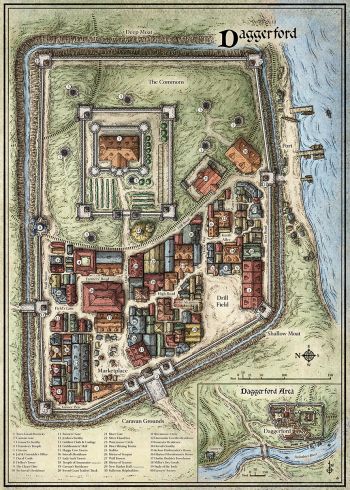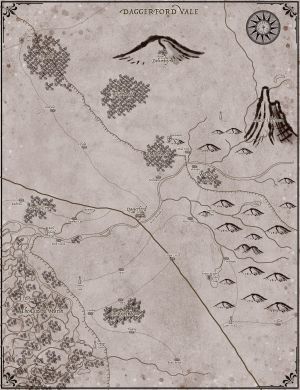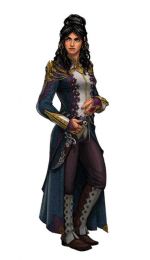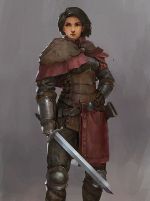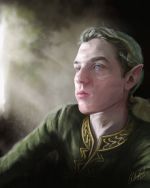Daggerford
Daggerford
|
Geographical Information
|
| Size: Small Town • Location: Delembyr Vale |
Societal Information
|
| Populace: 900; 2,000 including surrounding hamlets |
| Religion: Chauntea, Amaunator/Lathander • Shrines: Tempus, Tymora |
| Imports: various trade goods |
| Exports: Foodstuffs, various craft goods |
Political Information
|
| Government: Duchy |
| Ruler: Duchess Morwen Daggerford |
| Military: Local militia |
A walled town surrounded by pastoral fields, Daggerford's territory includes not just the town and its immediate fields, but also a handful of small hamlets for a day or two around it. The Daggerford family who rule the town style themselves "dukes" and "duchesses," and trace their lineage and right to rule back to the days when the area around Daggerford was theirs to govern in the Kingdom of Man that succeeded Phalorm in the region.
Government
Though Daggerford has a duchess, daily rulership is in the hands of the Council of Guilds, composed of the heads of Daggerford's guilds. They meet in masks and robes, in imitation of the Lords of Waterdeep, although everyone knows who they are.
Defenses
The largest and oldest building in Daggerford is the ducal castle, a three-level keep enclosed by a two-story wall that contains its own smithy, parad ground, and stabling. The dukes of Daggerford have always kept a well-stocked larder, capable of feeding the castle's inhabitants and any citizens that it might shelter inside during a siege.
A militia guards Dagggerford. Service is mandatory for all able-bodied adults, and lasts for twenty years. All citizens living within the town receive instruction from the duchess's own soldiers in the use of spears and other weapons, and must spend at least one day a month in defense of the town, standing sentry on its walls, or patrolling the nearby roads. Their training means that the common citizens of Daggerford aren't easily cowed by armed folk demanding goods, coin, or passage, and are slightly more likely to take up work as mercenaries, caravan guards, or adventurers.
Places of Interest
The following places use the numbers from the map of Daggerford.
Farmer's Quarter
- Caravan Gate (2): The Caravan Gate, which opens from the caravan grounds, is the most imposing of the city gates, with a set of huge ironbound doors twenty feet wide and sixteen feet tall.
- Cromach's Smithy (3): Smithy (3c). Founded over a century ago, now owned and operated by Tholvar Cragjaw, a distant cousin to Derval Ironeater.
- The Harvest House (4): Temple to Chauntea. Large building with an open, garden courtyard in its center. Led by Hadeshah, a priestess who grew up in the nearby hamlet of Gillian's Hill, and is uncomfortable with speaking before large groups. Three underpriests serve there.
- Residence: Saer Isteval (10)
- Farmer's Gate (11): This gate opens from the fields to the north and is so named because it is the gate that farmers use to bring in produce and livestock.
- Jerdan's Smithy (12): Smithy (2c). Jerdant Went's smithy operates in the margins of the town's other smithies, focusing on projects too plain or small for the others.
- Gublin's Cloth & Cordage (13): Cloth & Rope. Owned by Gilly Gublin, who sells imported cloth and the cord that he makes upstairs, using the rope twined in the long gallery by the marvelous machine he bought from the High House of Wonders in Baldur's Gate. The quality of his rope is such that he exports it upriver.
- The Guildmasters' Hall (14): Mercantile Guilds. The guilds of Daggerford are small, some of them consisting only of a single business. They regulate competition and set parameters for master-apprentice relationships, as well as having a communal voice in how Daggerford is run (by the city's founding charter). They include the Smiths' Guild, Merchants' Guild, Tanners' Guild, Farmers' Guild, Watermens' Guild, Rivermens' Guild, Taverners' Guild, Scriveners' Guild, Clothiers' Guild, and the Carpenters' Guild.
- The Happy Cow (15): Inn (2c). A homey inn run by the Hardcheese family of halflings, where the drink is cheap, the pace is slow, and the talk is about farming. The Hardcheeses own a large dairy operation, and sell many of their wares to patrons here – their beer-and-cheese soup is particularly tasty, warm, and filling.
- The River Shining Tavern (24): Tavern & Inn (4c). One of the oldest buildings in town, supposedly the first of them, predating even the ducal castle. Most clientele have plenty of coin to spend, among them visiting and local nobles, wealthy merchants, and even Lady Belinda Anteos of the Sword Coast Trader's Bank. There are private dining chambers frequently used by the Council of Guilds for its meetings.
- Residence: Ironeaters (33)
- Residence: Keldon Darktreader (35)
- Residence: Filarion Filverdonson (36)
- Helmick's Herbs & Oddments (40): Herbs & Oddments. A spice and herb shop owned by the half-elf Helmick Howager, who also tends to find strange oddments that many magicians find useful as material components.
Caravan Quarter
- The Decorated Man (16): Tailor (3c). A rock gnome illusionist named Ballick runs this tailory. He often uses his illusions to show customers what they might look like in his expensive garments. He lives above the shop with his large extended family.
- The Lady Luck Tavern (17): Tavern (2c). A taproom dedicated to Tymora, and run by a human woman named Glenys, who encourages gambling in the tavern and has sponsored larger games of chance. A table in the corner holds Tymora's Cup, a ceremonial offering to the goddess should she want to stop by for a drink. Those who have had good luck frequently "buy a drink for the Lady," and Glenys switches out the cup in its place of prominence.
- Fairfortune Hall (28): Shrine to Tymora. A simple building dedicated to Lady Luck, recently restored by Ironeater dwarves in grand style thanks to its current caretaker, the halfling Curran Corvalin.
- Miller's Dry Goods (38): Household Wares. Bess Miller owns this shop and three mills (one out of town to the north, another amid the farms west of the Floshin Estate, and a third in Bowshot, a village to the south). She is quite wealthy and eligible, although has shown no interest in her suitors. Her shop sells grain, flour, and various goods for the home.
- The Shanties: Transient Housing (1c). One and two-room shacks, the shanties serve as long-term housing for as long as those in them care to pay to stay. Usually inhabited by merchants waiting out winter or by young families finding their footing. Owned by a human man named Benthil Hugman.
Merchant's Quarter
- Residence: Curvan Corvalin (19)
- Sword Coast Traders' Bank (20): Bank. A bank run by the Waterdhavian House Anteos, allowing merchants to store profits and withdraw it from other branches (currently in Waterdeep and Baldur's Gate). Though Lady Belinda Anteos has managed to secure the trust of the merchants for that function, she would also like to come into the business of loans to the locals; unfortunately, they tend to go to the Hardcheese family for such.
- The Lizard's Gizzard (29): Inn. Offering neither food nor drink, the inn's sign depicts a young boy killing a lizardman with a dagger, a reference to local legend Tyndal. Owned and operated by a half-orc woman named Sasha, half the ground floor of the inn is also a laundry. Sasha has a soft spot for orphans and unfortunates, and Sasha takes in orphan girls and women in unfortunate situations, giving them work and the opportunity to get back on their feet. She has also been known to provide space for refugees for free before.
- Residence: Saer Darfin Floshin (37)
- Trade of the Tools (39): Tools & Furnishings (Refurbished) (1c). Buying and selling old tools and furniture that he has refurbished, the elderly and eccentric Old Ander is a well-loved local.
Riverman's Quarter
- Town Guard Barracks (1): x
- Jail & Constable's Office (6): The jail building houses Sherlen Miller, an office for her roles as town constable and militia commander, and a couple cells. The cells rarely hold any prisoners, except rowdies who need time to cool off or sober up. Suspects of serious crimes are held in the castle dungeons until trial. Less serious crimes are handled according Council of Guilds laws, in which imprisonment isn’t used as punishment.
- The Clean Chin (9): Barber & Undertaker. Run by the shield dwarf Hunnet Honestone, who splits her building in two to serve the two aspects of her business. She lives above the shop with her elderly mother Ranna.
- Derval's Bright Blade (34): Smithy (4c). A smithy that dates back to the 1300s, run until by its original master smith, the shield dwarf Derval Ironeater. Derval passed away in 1484 DR, leaving it to his grandson Ignal Ironeater.
- River Gate (21): This gate is slightly larger than the Farmers’ Gate to allow boats to be carried and dragged through to and from Sullerton Shipbuilders.
- Silver Flood Inn (22): Inn. A mining-themed inn founded during a short-lived silver rush in the Sword Hills in the mid-1400s, with a large breakfast room that features a variety of small two-person rooms. Owned by two Northmen, Connar Filvarson and Ganfar Redgrin.
- The Otter's Run (23): Tavern. A simple tavern located by the River Gate, with a sign that is a dried and stretched otter's pelt. Its owner Davvy Harga, is also a furrier, running that business out of the tavern as well.
- Table of the Sword (26): Shrine to Tempus. A small open-sided hall of thick wood pillars, with a sword permanently driven through the altar, a simple wooden table. Known to be patronized by the duchess, the shrine has seen some recent repairs thanks to her generosity. Overseen by Darrodar Gweth, a former soldier from Waterdeep.
- Daggerthrust Ales (31): Brewery (3c). A booming brewery business that produces lighter-hued, Calishite-style ales, as well as those that experiment with herbal ingredients such as High Moor heather and southern-imported hops. Owned by Sturgin and Halla Brewer, Sturgin's family has a long tradition of brewing, but Halla – originally from Calimshan – missed the drinks of her homeland enough that her loving husband tried his hand at brewing them, which has turned out well for them both.
- Residence: Darrodar Gweth (32)
Dagger Hill
- Cisterns (5): The squat stone cisterns capture rainwater, and the Watermens’ Guild takes water to them from a spring to the northeast. The cisterns are a legacy of a time when Daggerford was more frequently under siege, providing a source of pure water for livestock brought in from surrounding farms. Many people prefer cistern water to that from the river or the well in the marketplace, because they associate the spring that is its source with Eldath, a god of nature. Using it for cooking, ale making, and cleaning is supposed to bring Eldath’s blessing of peace and wellbeing.
- Castle Daggerford (7): The ducal castle stands in the same spot as Tyndal’s original wood fortification, rebuilt in stone by the Ironeater clan when it came to Daggerford over a century ago. The dungeons that worm through the hill beneath it are even older. They are all that remains of the Barony of Steeping Falls. The ducal gate leads to the town and is usually open. Inside the castle courtyard are the duke’s private parade grounds, herb and fruit gardens, and the duke’s fortified manor. The castle’s larder is well stocked with preserved food, enough for a year’s siege. About fifty people live in the castle, including guards and servants.
- Delfen's Tower (8): Wizard Residence. The residence of the wizard Delfen Ondabarl. When the wizard Delfen first came to Daggerford, this tower was under construction. He paid the town well to take over the tower in exchange for swearing to help protect Daggerford. Like the other towers, this one is three stories tall. The top story is Delfen’s living quarters. He uses the second story to meet guests, and teach and house students he takes on. The first story contains a stable for his riding mule and is used for storage. The tower’s arrow loops are small, since they’re intended to allow Delfen to target spells. The windows facing the town are larger, providing a him a good view.
- The Morninglow Tower (18): Temple to Lathander. Standing on a hill overlooking the rest of the town, the stone side of the hill that faces the town is decorated with rosy stones and glittering quartz, creating the image of the shining sun. The eastern wall is open to the rising sun. Luc Sunbright, a blustery sort of high priest, oversees the temple.
- Stables (25): Visitors and locals can shelter livestock in the stables, but because the small herd kept for the duke and the militia are cared for here, the duke virtually owns the business. During the day, horses graze on the commons around the castle or are taken out the Farmers’ Gate for exercise and feeding farther afield. A portly human male named Umbero Volin, originally from Turmish, runs the stables. Once a trick rider in a circus, Umbero settled in Daggerford after he sustained injuries during a performance for the duke. The circus he was part of was forced to leave him behind.
- The Walls & Towers (27): The walls of Daggerford are ten feet thick and twenty feet tall with a battlement walkway behind crenellations. The towers, entered from the ground and the walls, stand another ten feet taller than the walls and have bartizans at their outer corners.
- Sullerton Shipbuilders (30): Shipwrights. Owned by the Sullertons, a family led by matriarch Wilma Sullerton, who is also leader of the Carpenters' Guild. They build riverboats.
Outside the Walls
- Caravan Grounds: This muddy field is filled with wagons and tents in all seasons but winter. While caravan masters stay at the inns within the walls and do trade in the marketplace, their wagon drivers and guards camp in the field. This makes the caravan grounds a melting pot of people from up and down the Sword Coast.
- Moat: The steep-sided moat around Daggerford used to be the dumping place for the town’s trash and waste. In any year that the river did not flood and flush it, the Watermens’ Guild opened channels to the Delimbiyr to wash the worst away. During his time, Duke Maldewyn ordered an end to the practice of dumping into the moat. Watermens’ Guild members now wheel wagons of waste not needed by the tannery to Tyndal Bridge and dump it over the side. This practice makes for a poor welcome to travelers from the south, but it’s an improvement over the town being ringed in its own refuse.
- The Tannery: Leatherworks. West of Daggerford, atop a low hill, stands the tannery. The town’s Tanners’ Guild used to do its work on the open field alongside the caravan grounds, and many shallow depressions in the field reveal where half-bur- ied soaking tuns once stood. Generations ago, a sickness that spread from caravan merchants into the town was blamed on the stinking air from the industry. After that, the tannery moved to the drafty structure on the hill. Eastward winds still carry the tannery’s stink, but the town’s general odor has improved a great deal.
Daggerford Vale
The lower part of the River Delimbiyr, centered on the town of Daggerford, is called the Daggerford Vale.
- Anteos Manor: Noble Manor.
- Blackbranch Wood: Woods.
- Blackwood Manor: Noble Manor.
- Black Brook: Village.
- Blightwood: Woods.
- Cromm's Hold: Tower.
- Elfwood: Woods.
- Fleming: Village.
- Floshin Estate: Noble Manor.
- Gerd's Trees: Woods.
- Gillian's Hill: Village.
- Hilltop: Village.
- Liam's Hold: Village and Tower.
- May Creek: Village.
- Mud Creek: Village.
- Potter: Village.
- Rock Island: Village.
- Rock Island Tower: Ruins.
- Rushville: Village.
- Shimmer Lake: Village and Lake.
- Stillwater: Village.
- Twilight House: Noble Manor.
- Union: Village.
- Vantage: Village.
- Vantage Point: Tower.
- Warden: Village.
- Warden's Wood: Woods.
People
Most folk of Daggerford know one another, at least casually, by sight. Strangers are usually welcome, especially if they have coin to spend, unless such folk come armed and belligerent through the town. Guards stationed at each gate make note of new faces, but don't take action against those they don't recognize unless they are given reason to do so.
Local Nobility
| Duchess Morwen Daggerford Duchess of Daggerford • Lords' Alliance Although she is less amiable than her brother was, Lady Morwen is acknowledged as more capable of ruling Daggerford than Duke Maldwyn had been. She is well liked by the people, who understand that she has an honorable heart, and wishes what is best for Daggerford. She regularly trains with the militia, and is seen in the town wearing armor just as often as she is adorned in the finery befitting her station. She often visits the local shrine to Tempus, which only enhances her reputation as a pious woman. | |
| Saer Darfin Floshin Elven Noble Sir Darfin Floshin is an elf older than Daggerford itself. He longs to see a rise in cooperation between humans, dwarves, and elves in the region, such as was once embodied in the realm of Phalorm. Darfin has been advisor to many dukes of Daggerford through the yea.rs. Though he was rebuffed by Duke Maldwyn during his reign, there are signs that Lady Morwen may be more receptive to the advice of a gold elf who has witnessed the fall of the human kingdom of Delimbiyran, the founding of Daggerford, and all the days since. | |
| Lady Belinda Anteos Proprietor of the Sword Coast Traders Bank The proprietress of the Sword Coast Traders' Bank is a noblewoman out of Waterdeep given the responsibility by her family of managing this central branch of the family's newest endeavor. She has become a regular in Lady Morwen's court, and though the two aren't exactly friends, they have a certain respect between them. | |
| Lord Jothia Anteos Lady Belinda's younger brother A thoroughly Waterdhavian sort of rake, no one seems to really know why Jothia has come to Daggerford. General consensus seems to be that he is on the outs with the head of House Anteos in Waterdeep and has been sent into the country as some kind of punishment. |
Ducal Retainers
These characters serve the Duchess Morwen directly, usually with positions of authority around Daggerford.
| Saer Isteval Retired Purple Dragon Knight • Captain of the Daggerford Guard A former adventurer and Purple Dragon Knight of Cormyr, Saer Isteval was badly injured in battle with an ancient green dragon, leaving him with a permanent limp that has never fully healed, thanks to the wyrm's poison. He is a paladin of Lathander, and has settled into Daggerford as his retirement. He is happy to train others in battle, and is a confidant of the Duchess. | |
| Delfin Ondabarl Wizard An adventuring wizard from Iriaebor who retired to Daggerford in 1355 DR. Though presumed dead by 1385 DR, he returned in 1485 DR, not a day older, to reclaim his tower. He is a patient instructor of the arcane arts, and doesn't hesitate to aid the local militia in the defense of Daggerford. Most often seen on his daily mid-morning strolls through the market, Delfin nods hello to nearly everyone he sees and has a (slightly distracted) smile in general, but rarely stops to talk overlong with anyone. | |
| Keldon Darktreader Master of the Hunt A half-elf advancing in age, Keldon has served the dukes of Daggerford as Master of the Hunt for nearly two centuries. He is a skilled ranger, and knows the lands around Daggerford arguably better than anyone else. | |
| Sherlen Miller Captain of the Constabulary Sherlen is charged with keeping the peace in Daggerford, a task that gives her command over the jails and the ability to command members of the guard to assist her in given tasks. She usually has a small number of guards as part of daily duties assigned to her. |
Local Clergy
| Hadeshah Priestess of Chauntea • The Harvest House (Farmer's Quarter) Hadeshah grew up in the small hamlet of Gillian’s Hill, and she was accustomed to following her faith at family farms. She’s never taken well to speaking before large crowds or to daily life in town. When not far afield helping a farmer through lambing or joining a communal wheat harvest, she spends her time in the relative quiet of the temple garden. | |
| Luc Sunbright Priest of Lathander • Morninglow Tower (Dagger Hill) Self-important and blustery Luc Sunbright leads worship in the tower. The ducal family worships at this temple, and Luc considers the duke’s favor to be a mark of distinction he has somehow earned, despite the fact that dukes of Daggerford have worshiped here since long before he was born. The priest is very class con- scious, and farmers and merchants who come to rites at this temple can find themselves brushed aside in favor of wealthier folk. | |
| Darrodar Gweth Priest of Tempus • Table of the Sword (Riverman's Quarter) Darrodar used to be a soldier in Waterdeep, and he came to Dagger- ford after an ill-fated skirmish left most of his company dead. Although many priests of Tempus are interested in stirring up war, Gweth is more devoted to honor- ing the slain and giving warriors courage in battle. His home adjacent to the drill field gives him many opportunities to interact with soldiers, and he’s slowly winning people over. | |
| Curran Corvalin Priest of Tymora • Fairfortune Hall (Caravan Quarter) The halfling who looks after Fairfortune Hall claims to be from Baldur’s Gate and to have “lucked into” his money when a relative died, he won a bet, he had some investments come through, and he found a chest of jewels that someone had lost—all on the same day. Curran’s devotion to Tymora resulted, and his move to Daggerford came about because, he says, “Money is harder to hold onto in Baldur’s Gate.” Although Curran is a priest of sorts, he is no cleric and possesses no magical powers. | |
| Brevanne Druid • Daggerford Environs The owl-druid Brevanne is an occasional sight in Daggerford, usually showing up when she has business with the Duchess or someone else of importance, and then leaving the town as quickly as she can (sometimes in the shape of an owl!). Far more common a sight are the owls who occasionally fly into town bearing messages for her. |
Other Locals
| Glenys Owner of the Lady Luck Tavern The merry owner of the Lady Luck, Glenys not only encourages gambling in her establishment as a religious sacrament, but she often hosts or sponsors prizes for big gambling events. | |
| Mirie Barkeep at the Lady Luck Tavern • Mother Arcri (Darburl) One of the barkeeps at the Lady Luck, the halfling Mirie seems to know everyone and is very good at making new friends. She takes a great deal of pride in her ability to remember everyone's favorite drink. She is a very sore loser at gambling, however. | |
| Filarion Filverdonson Trader An elf with some relation to House Floshin, Filarion is a merchant and trader, frequently investing in caravan operations. He is reclusive and sour, although he does occasionally come out to hear new minstrels perform when someone new is in town. | |
| Nenkin Danniker Zhentarim Agent (Viper • Rank 3) Sometimes called "the Snail" for how slowly and deliberately he speaks, the halfling Nenkin is a local agent of the Zhentarim. Most of the time, his job is simply to act as liaison for those merchants and locals who wish to hire Zhentish mercenaries or trading space in a Zhentarim caravan. He maintains a small force of about a dozen Zhentarim infantry mercenaries, as well as a small group of outriders known as the Seven Snakes. |
Trade Routes
Roads & Trails
The High Road passes right past Daggerford, providing a great deal of access for trade and travelers. Tyndal's Bridge is a low stone structure over which travelers pass when approaching from the west, where a local boy named Tyndal held off a number of lizard- folk with only a dagger. He grew to manhood, married the local ruler's daughter, named himself duke, and built Daggerford atop the ruins of an older castle.
Waterways
The Delimbyr River flows right beside the town of Daggerford, and part of its flows are diverted off to form the moat around the castle.
Winter Trade
The cold hand of the Frostmaiden grips the Trade Way through the Daggerford region for much of the winter months. The end of Marpenoth is (usually) the time of the last "reliable" caravans on the Trade Way, due to the many cold, cloudy, wet days in Marpenoth making it a “month of mud.” When it rains, the cold and overcast keeps a lot of water from "burning off" in full sunlight, because there's so little of it, and the road gets muddier and muddier.
Some stretches of the road, particularly through rocky regions, stay open longer, and, during the winter months, emergency supplies can be moved over short distances by "wagon sledge" (giant covered sleds). But inexpensive, reliable travel fades away as one starts into Uktar. An early winter would make parts of the road impassable by mid- Marpenoth or a tenday later; a late winter might make travel possible until mid-Uktar, but no one could "count on" that, so the late caravans would be run by risk-taking caravan masters who would charge high rates to shippers (making only small, light, valuable cargoes profitable). A mild winter really doesn't help shift the dates, but a rare (one in thirty) drought winter will.
During the winter months, exposure to the cold plus marauding wolves and the like make caravan travel prohibitively expensive, as traders would have to bring along extra guards, and carry food for the carters and the guards and the draft animals, plus fuel to keep them all warm, driving up costs. Once snow gets deep, draft and pack animals find it really tough going, so only light, small, very valuable cargoes that aren't harmed by freezing (like coins and messages and certain alcoholic drinks and perfumes, and a few gems packed in clay or other protective manners) would be moved overland until spring.
An early spring would make Tarsakh the only mud- month around Daggerford, so wagon travel could start up at Greengrass, and be in full spring as Mirtul proceeded. A late spring might prevent wagons moving until mid-Mirtul. Again, the problem is a month of road-mud as the thaw coincides with frequent rainfalls (the reason Tarsakh is known as the month of storms).
